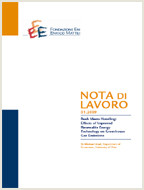Clean or “Dirty” Energy: Evidence on a Renewable Energy Resource Curse

29.06.2011
Caterina Gennaioli, Massimo Tavoni
D73, O13, P16
Corruption, Natural Resources Curse, Wind Energy, Political Economy
Energy: Resources and Markets
Giuseppe Sammarco
The aim of this paper is to provide an assessment of the potential for resource curse in the renewable energy sector. Taking a political economy approach, we analyze the link between public support schemes for renewable energy and the potential scope for rent seeking and corruption. The insights of a model of political influence by interest groups are tested empirically using a panel data of Italian provinces for the period 1990-2007. We find evidence that a curse exists in the case of wind energy, and specifically that: i) criminal association activity increased more in high-wind provinces and especially after the introduction of a more favourable public policy regime and, ii) the expansion of the wind energy sector has been driven by both the wind level and the quality of political institutions, through their effect on criminal association. The analysis points out that in the presence of poor institutions, efficient market-based policies can have an adverse impact. This has important normative implications especially for countries that are characterized by abundant renewable resources and weak institutions, and are thus more susceptible to the private exploitation of public incentives.
